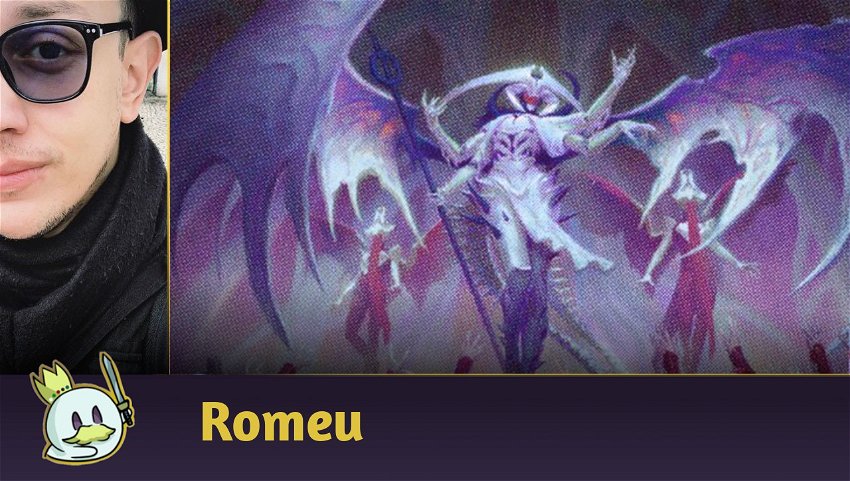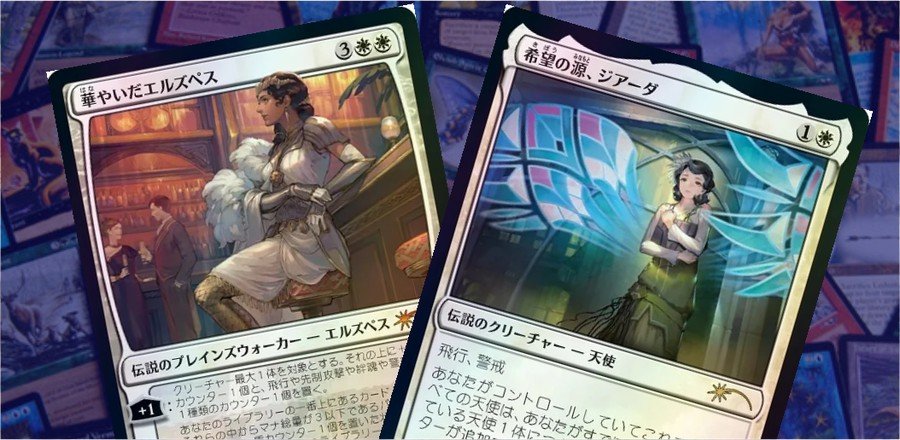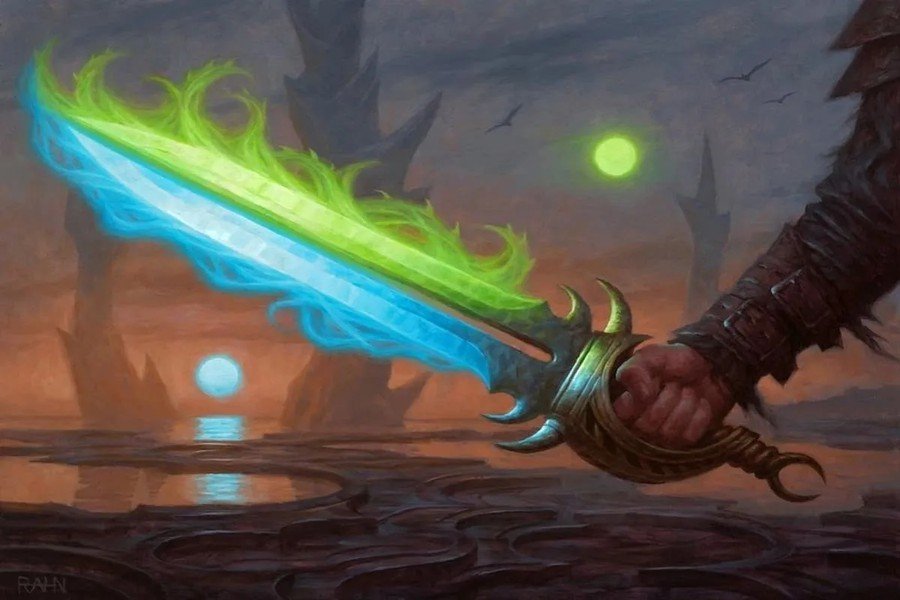With preview season for March of the Machine starting March 29th, it's time for us to look at how much Phyrexia: All Will be One affected the main formats and how it changed the competitive environment.
Standard

There's no way we can discuss Phyrexia without mentioning the impact that Atraxa, Grand Unifier had on the game as one of the best mana cheating payoffs ever. Since then, we've seen her play alongside Invoke Justice, The Kami War, The Cruelty of Gix, and a variety of other archetypes on Standard.
Among these, the strategies that obtained the best results were the Rakdos/Grixis shells, already very famous in the format, which adopt the combination of Atraxa with The Cruelty of Gix to play with the Phyrexian staple.
In addition to them, the lists with Invoke Justice deserve to be highlighted for merging an efficient base of Mono White Midrange with a notoriously unfair game plan against a significant portion of archetypes that lack some efficient removals.

Slowly becoming another multi-format staple, Skrelv, Defector Mite has become the perfect one-drop for a variety of creature-oriented archetypes in Standard.
Among those that already existed before the release of the set, Esper Legends was the one that benefited the most from Skrelv, as it gave the deck an efficient legendary creature that protects the various high-impact threats that the list runs, in addition to making it Plaza of Heroes a staple and an excellent manafixer.
Skrelv also became a recurring inclusion in Azorius Soldiers.
However, with the support that Poison received in the set due to the Toxic mechanic, a new archetype focused on this strategy emerged in the Metagame, being today one of the main competitors among Aggro decks in Standard, the Selesnya Toxic.
Focused almost entirely on cards released in Phyrexia: All Will be One, Selesnya Toxic bets on a "go-wide" strategy, that is, putting several threats into play while protecting the most important ones with Skrelv or Tyvar's Stand or punishing removals with Venerated Rotpriest, plus the inevitability of always having a threat on the board with Skrelv's Hive.

Skrelv's Hive also gained prominence on the sideboard of Mono White Midrange, which rose to the top of the format during the first few weeks thanks to the important additions that the set brought, such as The Eternal Wanderer and Ossification.

Finally, as redundant as it sounds, the Fast Lands were the most impactful cards from Phyrexia for Standard, given that they helped a lot with early game manafixing, allowing Aggro decks to play within their curves and Midranges have the proper color distribution at the right timing.
Pioneer

As with Standard, Fast Lands were the most important cycle of the new set for Pioneer, putting allied color combinations with as consistent mana as enemy colors have had since the format's birth.
This improved the consistency of decks like Rakdos Midrange and Gruul Vehicles, while allowing more efficient aggressive archetypes to arrive in the Metagame, such as Selesnya Auras, played by Benton Madsen on the Pro Tour.
Catching many opponents off guard, Selesnya Auras gained ground in the Pioneer Metagame after Benton's impressive tournament result.
In addition to the increased consistency provided by Razorverge Thicket, another reason for its recent success was the inclusion of Skrelv, Defector Mite as a pseudo-Mother of Runes which, in addition to ensuring that your Auras stay on the creature while protecting it, it also helps close off remaining damage by ensuring it can't be blocked by creatures of the chosen color.

Skrelv, Defector Mite has also found a place in other strategies, such as Mono White Humans, where it protects your main creatures, while Ossification is an efficient removal for two mana that offers no reward to the opponent.
Razorverge Thicket also helped Abzan Greasefang increase the consistency of its mana base, which possibly allowed it to reconfigure its shell and establish a new version, like the one piloted by David Inglis at the Pro Tour Phyrexia, where it takes advantage of additional consistency with Traverse the Ulvenwald alongside the Delirium package.
Greasefang has grown in popularity since then, especially in Explorer, but it wasn't the only established strategy that grew with the set's release:

Gruul Midrange was another strategy that gained some nice additions with ONE besides the consistency boost with Copperline Gorge, such as Migloz, Maze Crusher as a threat with a power greater than its cost and good mana sinking abilities, and Thrun, Breaker of Silence as an excellent Sideboard piece against decks filled with removals.
Atraxa, Grand Unifier appears in a variety of strategies, such as Gruul Transmogrify in Explorer, or in some variants of Indomitable Creativity. But in Pioneer, the deck that has been making the best use of the Phyrexian Angel is the combo with Delve alongside Neoform, which allows it to be put into play as early as the third turn. Even some variants have been adopted to unite other proposals in the list, such as Soulflayer.
In addition, other cards from the set made occasional appearances: Elesh Norn, Mother of Machines became a staple as a one-of in Goodstuff strategies like Niv-to-Light and Five-Color Fires, The Filigree Sylex tends to be present on the sideboard of Nykthos Ramp, and Sheoldred's Edict has become a standard removal in Dimir Control.

Modern
While none of these have changed the current state of the Metagame, Phyrexia has also brought some additions to Modern.
The Mycosynth Gardens became a mandatory piece in the Amulet Titan due to its ability to copy Amulet of Vigor for a low cost. The reason is that each artifact triggers separately, allowing its controller to untap a bounce land and, in response to the next trigger, tap it to add mana and then untap it again.

With virtually more copies of Amulet of Vigor, the deck's combos become more explosive and consistent.
Another recent addition for consistency was Jace, the Perfected Mind in Dimir Mill, where the Planeswalker allows hold the opponent's clock, gain card advantage and mill 12 to 15 cards from the opponent the moment it comes into play, making it a powerful value play that greatly accelerates the archetype's clock.

Another interaction that was present in the format with Phyrexia was the inclusion of Elesh Norn, Mother of Machines in Goodstuff lists to abuse the triggers of permanents like Fury, Solitude, and Omnath, Locus of Creation. Elesh is also an excellent threat on the mirror, as it prevents the ETB of your opponents' creatures from triggering.
Other cards have become staples within certain strategies, such as Tyvar, Jubilant Brawler in Devoted Druid decks, as it allows the immediate execution of the combo the moment the elf enters the battlefield, while also collaborating in both fetching its pieces and retrieving them when needed.
Atraxa, Grand Unifier also found a home in Modern in the Goryo's Vengeance lists, where it fights for a spot against Griselbrand with its ability to find the parts to perform a second round of the combo on its own, or even allowing it to set up with Emrakul, the Aeons' Torn the next turn.

In less all-in-oriented versions, Atraxa is also the perfect pitch for Elementals like Solitude and Grief.
Finally, Venerated Rotpriest added yet another layer of complexity to Infect, providing a way to win the match outside of combat. The creature also has a combo alongside Ground Rift, which didn't make expressive results this season.
Pauper
Pauper is perhaps the least affected format by Phyrexia in a competitive sense, but it has also received a few one-off additions that players have been testing out over the last few weeks.

One example is the inclusion of Barbed Batterfist in the Boros Synthesizer lists, where it interacts with Kor Skyfisher to create an army of 2/2 creatures on the battlefield, while its addition of can improve the clock.

Myr Kinsmith appears in some combo lists to increase the amount of Myr Retriever in the list, as it is an essential piece to close loops with Ashnod's Altar in Tron.

But the real highlight of this set for Pauper were the spells that add poison counters or proliferate on their resolution, which allow for some powerful iterations in the format and/or even establishing new archetypes:
While some lists bet on the "Creatureless Control", using spells that poison the opponent in addition to others that proliferate to win the game, others use the interaction of Proliferate with permanents that generate mana based on counters, such as Pentad Prism and Everflowing Chalice to play a huge turn where you cast multiple spells and close the game by poisoning the opponent with that sequence.
Despite none of these versions being within the competitive scene today, their creation demonstrates that Pauper still has room to innovate and seek new strategies.
Legacy

The most impactful card in Phyrexia: All Will be One for Legacy was Atraxa, Grand Unifier, which deserved testing in several strategies, from Reanimator to Sneak & Show
!
The creature also found slots as one-ofs in strategies that seek to resort to some combo elements with Natural Order to search for a green creature and put it on the battlefield.
The other card in the set that was featured for a few weeks was Mercurial Spelldancer in Izzet Delver!

Spelldancer is an evasive threat that, in addition to pitching Force of Will, benefits from the high amount of free spells and low-cost cantrips in the format, and turns any of your spells into a 2-for-1 through an easy-to-obtain effect in the format.
Now without Expressive Iteration, Izzet Delver will have to find other ways to gain value during matches, and while it doesn't offer immediate card advantage like Iteration or recurring as easily as Dreadhorde Arcanist, Mercurial Chemister is an adequate candidate to gain space in what may still be the best deck in the format.
Conclusion
Phyrexia: All Will be One brought with it some cards that affected the competitive Metagame. Among them, Atraxa, Grand Unifier stands out, which managed to be present in practically all formats in which it is legal and still has the potential to get even better when March of the Machine brings the new card type, Battle.
In addition, the set caused some important changes in Standard that broke part of the polarization of Grixis Midrange at the top of the Metagame, brought one of the most coveted land cycles to Pioneer, in addition to some punctual additions to older formats like Pauper, Modern and Legacy.
Thanks for reading!













— Comments 0
, Reactions 1
Be the first to comment